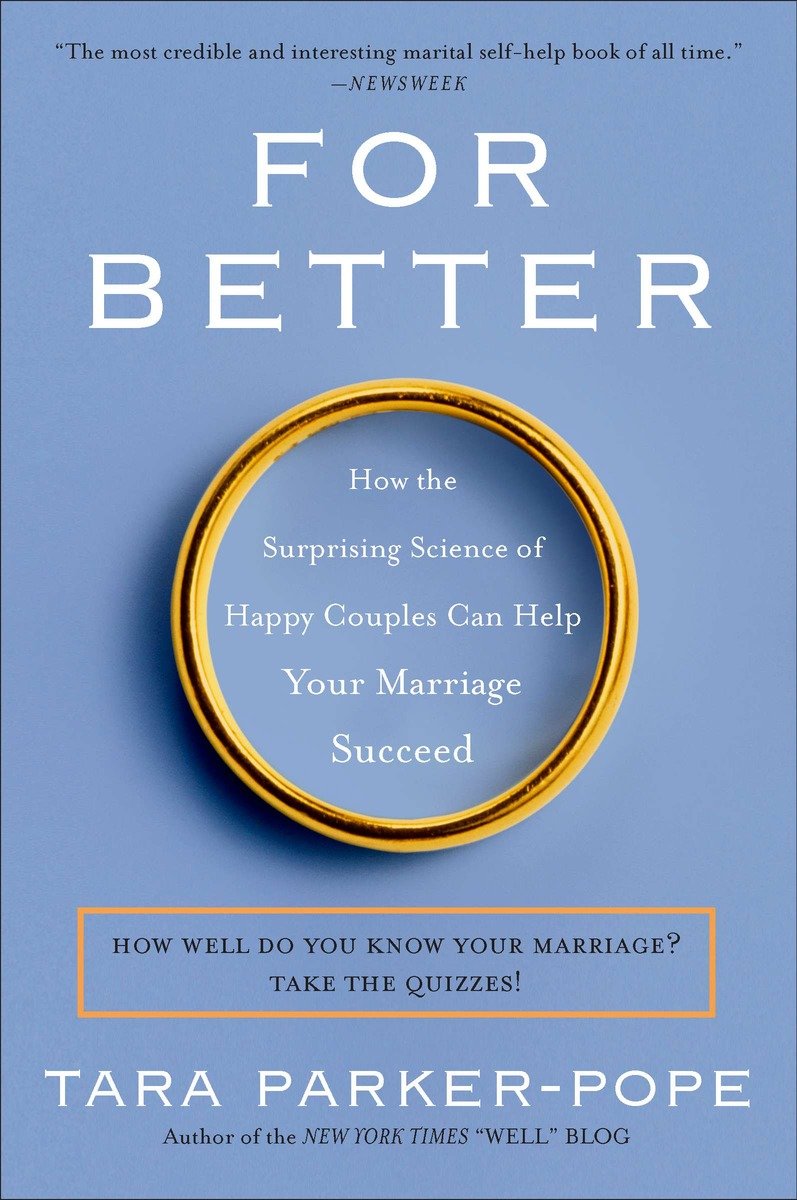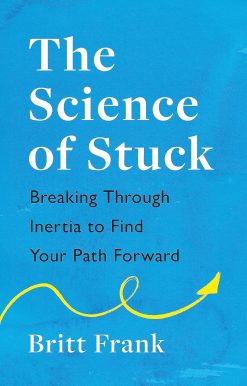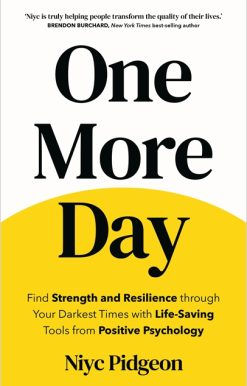For Better: How the Surprising Science of Happy Couples Can Help Your Marriage Succeed
19.00 JOD
Please allow 2 – 5 weeks for delivery of this item
Add to Gift RegistryDescription
“The most credible and interesting marital self-help book of all time.”—Newsweek Editor of The Washington Post’s Wellness Department and former New York Times columnist Tara Parker-Pope is one of the most popular and e-mailed journalists in the nation. In this eye-opening—and ultimately optimistic—look at marriage today, Parker-Pope reveals the heart behind the statistics to bust the myths and share the true secrets to marital happiness.Among her surprising findings: • most marriages today are succeeding • newlywed couples who don’t fight are at a higher risk for divorce than those who do • how couples divide household chores influences how often they have sex Whatever their stage of life or marital status, readers will be fascinated and buoyed by this classic in the making.
Additional information
| Weight | 0.32 kg |
|---|---|
| Dimensions | 2.14 × 13.24 × 20.27 cm |
| PubliCanadanadation City/Country | USA |
| Author(s) | |
| Format Old` | |
| Language | |
| Pages | 368 |
| Publisher | |
| Year Published | 2011-4-26 |
| Imprint | |
| ISBN 10 | 0452297109 |
| About The Author | Tara Parker-Pope is the editor of The Washington Post's Wellness Department and the former author and founding editor of the "Well" blog for The New York Times. She appears regularly on radio and television, including Today, Good Morning America, and CNN. |
"A jam-packed, lucid survey of the science behind a sound marriage. No wonder she is so popular."—Mehmet Oz, M.D., host of The Dr. Oz Show and Vice-Chair and Professor of Surgery at Columbia University "This terrific informative book on marriage should be given out with every marriage license! There is something here for everyone, gay or straight, newly married or celebrating many years! Highly recommended."—Susan M. Love, author of Dr. Susan Love's Breast Book and Live a Little "Finally! A real guide to making your marriage work. Tara Parker-Pope gives us all the latest concrete scientific information about how to get and keep life's greatest prize—a good partnership. It's educated; accurate; and honest. And it's a good read."—Helen Fisher, Ph.D., author of The New York Times bestseller Anatomy of Love "This is science writing at its best. Tara Parker-Pope has as keen an eye for sociological spiderwebs as Malcolm Gladwell. She takes the most hidden-in-plain-sight situation—a struggling marriage—and cleverly follows all the causative strands."—Christopher McDougall, author of the New York Times bestseller Born to Run: A Hidden Tribe, Super Athletes, and The Greatest Race the World Has Never Seen "Step by step, Tara Parker-Pope demystifies our most entrenched assumptions about love, sex and marital bonds. By translating the latest science into engagingly told, smartly considered insights, Tara has given us a landmark look at marriage—and profound reasons for optimism about the love in our lives."—Jeffrey Zaslow, author of The New York Times bestseller The Girls From Ames "A truly excellent exploration of marriage, written in clear and compelling prose, delighting the reader with surprising observations."—Jerome Groopman, M.D., author of the New York Times bestseller How Doctors Think "I couldn't wait to read Tara Parker-Pope's For Better, consuming it in one swoop. Tara takes her rigorous reporting in a field swamped with self-help books and cuts through to the science of marriage, returning with lessons that are counterintuitive: it's the little gestures that matter, eye-rolling is a predictor of divorce rates, and having outside friends can help strengthen a marriage. This is a book that parents will give to their children, groomsmen give to their friends, and spouses will give to each other for a long time to come."—Jennifer 8. Lee, author of the Fortune Cookie Chronicles "A savvy, practical guide for side-stepping the doggy poop and dead ends that all couples encounter along that zany, zig-zaggy path we travel from 'I do' to 'I can…and will!'"—Harvey Karp, M.D., author of the New York Times bestseller The Happiest Toddler on the Block "A gem of a book on marriage. It is chock full of rich scientific findings and tips on how the male and female brain can love better and live better together. Reading this book will absolutely improve your marriage."—Louann Brizendine, M.D., author of The Female Brain and The Male Brain “Countless self-help books have been written about marriage. It’s the rare work, however, that has the rigor and factual grounding of For Better: The Science of a Good Marriage. Written with a sharp eye by New York Times health reporter Tara Parker-Pope, the book examines research studies on marriage and distills their findings into lessons for couples… Armed with studies showing the health and financial perks to being married, and sharing proven ways to achieve a happy union, Parker-Pope succeeds in making a convincing argument for investing in our marriages.”—Rasha Madkour, Associated Press “Recommended reading for GeekDads and GeekMoms—indeed, for anyone contemplating marriage (or divorce).… For Better is great because it gives you a way to assess the health of your marriage and find its strengths and weaknesses, and then offers concrete steps towards addresses the problem areas.”— Jonathan H. Liu, Wired “Well-crafted, comforting, helpful—yes. For Better is a good gift for the lovelorn.”—Susan Jane Gilman, NPR.com |
|
| Excerpt From Book | IntroductionThe Scientific Study of MarriageWhat makes a good marriage? The mystery of why some marriages succeed while othersfail is something men and women have been trying to sort outfor decades. What qualities make some people more successful atnavigating the stormy waters of love while others lose their way?Why do some couples seem happy together while others are happiestapart? And is there any way to protect a marriage from the risksof stress, negativity, and divorce? The answers to those questions come from a surprising place.Far from the therapy couch or self-help gurus, the best insightsabout love and relationships are coming from the scientific community.Top relationship researchers from dozens of universitiesaround the world have devoted their careers to observing couplesinteract, collecting voluminous amounts of data about how menand women communicate, both in the words they use and in theirbody language and facial expressions. They have tracked pulse rates,blood pressure levels, and other physical responses that occur whencouples talk, laugh, and argue. Scientists have even measured theeffect marital conflict and stress can have on the immune systemand the body’s ability to fight off colds or heal a wound. Brain scanstudies of the newly in love and the long married offer glimpsesinto the physiological underpinnings of both passionate and lastingromantic love. It’s now possible to deconstruct a marriage down to its most basicparts and predict, with surprising accuracy, the likelihood that amarriage will survive or end in divorce. Using computer-assistedcoding programs and body sensors, scientists have analyzed thousandsof hours of video recorded conversations between couples,tracking everything from facial movements and body language topulse rate, sweat, and skin temperature. Computer-assisted wordanalysis programs have allowed researchers to pick apart conversationsbetween couples and find meaning hidden in the rhythms andpatterns of the words couples use when they communicate. The insights these researchers have gained will give you anentirely new way of looking at your own relationship. The findingscan be translated into surprisingly practical advice for couples. Agesture as seemingly minor as eye rolling or the manner in which aman retells the story of how he met his wife can be strong predictorsof happy married life or a looming divorce. Scientists have evenapplied mathematical models to marriage, calculating, for instance,that strong marriages have at least a five-to-one daily ratio of positiveto negative interactions. Simply translated, that means it’s notenough to apologize for mistreating your spouse. For every mistakeyou make, you need to offer five more good moments, kind words,and loving gestures to keep your marriage in balance. Scientists have also studied divorce and can now tell coupleswhat risk factors make their marriages most vulnerable. How couplesargue, who starts the fight, and even the pronouns they use inconversation can all signal the success or failure of a marriage. Agedifferences, children, how often a couple has sex, and numerousother factors have all been studied in a daunting scientific questto apply the logic and rigors of science to one of the most complexemotional relationships of our lives. The good news from the study of marriage is that today, farmore people are succeeding at marriage than failing. While thatmay run counter to the conventional wisdom, in reading this bookyou’ll learn the truth behind marriage and divorce statistics andwhy marriage today is stronger than it has been in decades. You’ll also discover that assessing the overall health of your marriage(or the marriage potential of a prospective partner) is easierthan you think. The trick is learning to distinguish between thenormal, everyday conflicts and frustrations of human relationshipsand to focus on the real issues that may be standing in the way of abetter relationship. Did you know that solving your money problems can help solveyour marital problems? Or that when you fight with your partner,the first three minutes of the argument count the most? Or that thedivision of housework duties in a home can have a direct impact ona couple’s sex life? Whether you are embarking on a new marriage, hoping to rescuea troubled relationship, longing to get it right the second timearound, or simply looking for ways to improve a good marriage, thescientific study of marriage has resulted in simple, practical advicefor determining what matters most in a relationship and where tofocus your energy to make it better. My interest in the science of marriage stems from my own searchfor answers. As a longtime health writer who has spent hours readingmedical and scientific journals, I often urge readers to take chargeof their health and make decisions based on the available scientific evidence. But when my own seventeen-year marriage began tocrumble, I found myself struggling to make sense of it. Bookstoreshelves are filled with marriage advice books and self-help guides,but I couldn’t relate to the “straight talk” and platitudes found inmost of them. I knew where to look for answers about heart disease,diabetes, allergies, and numerous other health issues, and I wantedthe same objective, evidence-based advice about my marriage. Using the Internet and medical and social science databases, Ibegan to search for research on marriage and relationships. I wasstunned to find a vast world of marital science beyond the self-helpaisle. For decades, numerous scientists, from universities aroundthe world, have been churning out credible, quantitative researchfilled with practical advice about marital health. As a result, I set out to explore what science has taught us aboutlasting relationships and the complexities of courtship, love, andmarriage. Over the past few years I’ve interviewed dozens of theworld’s top marriage and relationship researchers and pored overhundreds of published research studies. I’ve seen seemingly happy marriages, including my own, cometo an end. Many had fallen victim to infidelity, while others seemedto crumble under the burdens of parenting and the demands ofmodern living. Could any of us have known that it would end thisway? Should we have seen it coming? Was there a way to inoculatea relationship from the devastation of divorce? The answer to all these questions is yes. Understanding thescience of marriage gives us a crystal ball of sorts, to better predictwhich relationships will work and who will struggle to staytogether. I realize now that had I known more about the basic scientific truths of love and marriage, I would have seen the limits ofmy own relationship from the beginning and noticed the telltalesigns of trouble years sooner. Armed with the knowledge, I mighthave made better choices that could have helped save my marriage,or at least given me more confidence about the choice my husbandand I made to end our relationship. What’s so important about this scientific study of marriage is thatit views the most important relationship of our life as a significanthealth issue that affects us both physically and emotionally. The goal isto diagnose and treat marital problems just as a doctor would diagnoseand treat cancer, diabetes, or any other important health concern.And just as doctors know that certain lifestyle habits influencedisease risk, the scientific quest to better understand marriage hashelped us identify important risk factors for divorce. Researchershave found practical ways that couples can better insulate a marriageagainst failure. And there’s even advice to help long-marriedcouples reignite the passion and excitement that they experiencedduring the early romance of their courtship. Each chapter of this book will explore the science behind variousaspects of marriage, such as monogamy, love, sex, children, money,housework, and conflict. Most important, this book will translatethe science of marriage into practical, actionable advice—a prescriptionfor marital health—that you can use to improve your relationship.In some chapters, you’ll even find the measurement scalesand quizzes researchers use to gauge the quality of a relationship orthe depth of passion and commitment couples feel. My hope is that in reading this book, you will gain insights aboutyourself, your relationship, and possibly even the marriages of yourparents, in-laws, and others closest to you. While the title of thisbook and much of the research it explores focuses on marriage, thelessons learned often are applicable to any couple hoping to pursuea committed, long-term relationship. Understanding the scienceof love and marriage can help single people make better choices inthe pursuit of their ideal mate. For some readers, the science mayempower them to extricate themselves from a doomed relationship.But hopefully, for most readers, the findings will arm themwith the information they need to save a struggling relationship orstrengthen a good one, giving them a specific prescription to boostthe health of the most profound relationship of their lives. Saving or improving your marriage is worth the effort. Researchshows that couples in stable relationships have more sex, moremoney, and live longer, healthier lives. Whether you are content ina long, stable relationship, in the idealistic throes of early romanticlove, or leaving a failed marriage in hopes of doing better next timearound, the scientific study of marriage has put the secrets of long termlove and happiness within your grasp. |
Only logged in customers who have purchased this product may leave a review.






Reviews
There are no reviews yet.